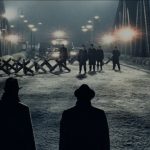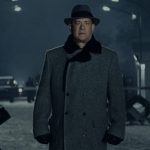Bridge of Spies – 2015
When I was coming up to this film, I knew it would be a good movie for two reasons. It starred Tom Hanks and was directed by Stephen Spielberg. How could it be a bad film? Those two don’t put out sub-par work. I have never seen a bad film in which either of them have been involved. Bridge of Spies was no exception.
It was a film that was based on the true events of the Cold War between 1957 and 1962, during which a New York City insurance lawyer named James Donovan, played by Hanks, is hired to defend suspected soviet spy, Rudolph Able, played by Mark Rylance. Donovan is told before the trial that the man is guilty, and that he will be convicted, but that they wanted to show the world that the United States gives every man, citizen or not, a fair trial. But the CIA got more than they bargained for in Donovan. He defends Able so well, he convinces the judge to forego the death sentence in favor of thirty years imprisonment. Visiting the judge privately, Donovan uses the argument that if the Russians ever captured an American spy, Able could be used in a prisoner exchange.
Several years after the sham of a trial, an American top-secret spy plane is shot down over the USSR. The pilot, Gary Powers, played by Austin Stowell is supposed to commit suicide rather than allow himself to be captured. But when his plane is shot down, he parachutes to the ground and is taken into custody by the Russians. The CIA hires Donovan to negotiate a prisoner exchange, Able for Powers, who is being held by the Soviets. Around the same time, and as the Berlin Wall is being built, an American medical student named Frederick Pryor, played by Will Rogers, is arrested in East Berlin by the German Democratic Republic, or GDR. Donovan, still in the capacity of an unofficial representative of the United States, decides to negotiate the exchange for not only Powers, but Pryor as well, even though his CIA bosses make it clear that Powers is the target, and Pryor doesn’t matter.
While the first third of the film focuses on Abel’s initial trial and conviction, the second third focuses on the fallout from Donovan’s efforts in the case. The final third is all about Donovan’s time in East Berlin, negotiating the prisoner exchanges. Hanks did his usual great job, though this roll was more understated than other parts I have seen him play. The script didn’t call for anything over the top or deep, but Hanks is such a skilled actor, he gave the character an emotional depth that went beyond the script. He just played Donovan as such a likeable guy.
I also really liked Mark Rylance’s portrayal of Rudolph Able. Though he was a soviet spy, he was also a patriot who had a job to do for his country, and though he was on “their” side, he carried out his duties in an honorable way. Rylance played him as calm and mild-mannered, a man who, in other circumstances, might have been a nice man to know. By the end of the film we even see him as a sympathetic character, almost a tragic hero. In fact, Rylance took home the Oscar for Best Supporting Actor for his efforts.
But a lot of this had to do with the excellent script, which was written by Matt Charman and the famous directing duo, Ethan and Joel Coen. Bridge of Spies, among other nominations at the Academy Awards, a total of six to be exact, was nominated for Best Original Screenplay. The script was smart and engaging, easy to follow, and sprinkled with just the right amount of light humor to keep things from getting too bogged down in self-importance. The film had great pacing. It had a bit of intensity, especially in the climax, in which Donovan manages to get both Powers and Pryor back. Not knowing the historical details, I wasn’t sure if the prisoner exchange would happen without a hitch or not. I kept expecting either the Soviet or the American snipers present at the exchange site to get trigger happy and shoot one of the prisoners or Donovan, but that didn’t happen.
Other notable actors in the movie who also played their parts well were Alan Alda, playing Thomas Watters, Donovan’s boss at the insurance company, Amy Ryan, playing Donovan’s wife, Mary, and Scott Shepherd as CIA Agent Hoffman. I also really liked Mikhail Gorevoy, the Soviet agent, Ivan Shishkin, and Sebastian Koch as the GDR agent, Mr. Vogel. Of course, everyone did a fine job.
As I usually do when researching a movie based on true events, I did a little reading and found the film was mostly accurate in the details, though there were a few minor changes made for dramatic effect. For example, there was the fabricated scene in which someone fires gunshots at Donovan’s home because he defended the “Commie” spy, or the scene in which Donovan is mugged in East Berlin and his overcoat is stolen. But these things are minor.
But a fact that I found incredibly interesting actually appeared as text on the screen at the end of the movie to tell what happened to the characters. Donovan’s epilogue said that he was later hired by the JFK Administration to negotiate the release of 1,113 prisoners of the failed Bay of Pigs invasion. By the time he was done, he had secured the release of 9,703 men women and children from Cuban detention. I’d say that’s pretty darn impressive.








